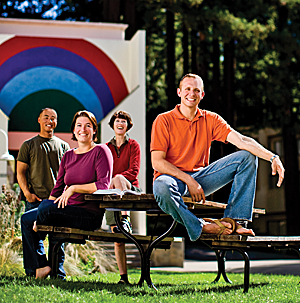Joshua Karrasch was close to bottom when he arrived at UC Santa Cruz in 2007.
A former Navy corpsman who spent a tour of duty treating patients in sweltering field hospitals in Kuwait, he had exactly $5 to his name. He had just been through a divorce and had been forced to sell his house at a loss. His health was damaged by years of heavy drinking.
But the 27-year-old Karrasch had loved treating patients in the Navy--the feel of serving others and saving lives. He dreamed of becoming an emergency room doctor.
"Once you have a goal, you just have to find a path to achieve that goal," said Karrasch, who learned the value of hard work from his disabled-veteran father.
The path led him to UCSC.
With his Navy retirement money, Karrasch bought a beat-up 23-foot travel trailer where he could live and got part-time jobs as a paramedic and a handyman. He began classes in psychology and biology, eventually choosing psychology as a major. But even though he loved the wooded campus, life as a student was still an uphill climb.
| Related story: STARS helps uncommon students shine |
But like most vets, he said, he had a hard time asking for help.
Then, Karrasch discovered a UCSC program called Services for Transfer and Re-Entry Students, or STARS, which not only provided a quiet place to study, but showed him how to shave a year off school by tailoring his classes to the medical schools he wanted to attend.
He even learned he could have gotten a loan to tide him over through those first few weeks of school.
"STARS gave me a sense of family and a base of operations. It was wonderful support," said Karrasch.
So the man who believes in helping others agreed to help STARS develop a peer-mentor program for veterans. Called Veterans Education Team Support, it pairs vets on campus with incoming service people to ease the transition to university life.
A few weeks ago, Karrasch got an e-mail from a soldier in Iraq who wanted to know what it took to go to college when he returned. Karrasch directed the soldier to financial aid and admissions officers who could get him started.
And that, he said, made him feel good.



